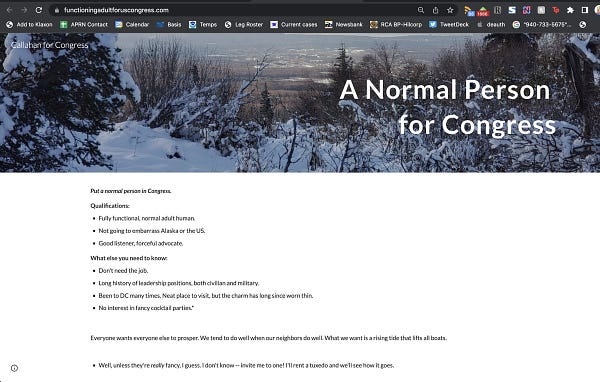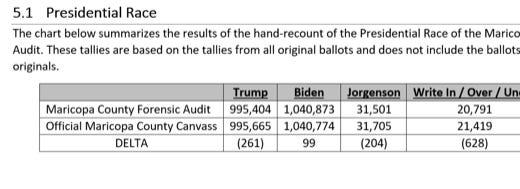
The Daily Agenda: Financial disclosures don't disclose much
We wish the laws about lawmakers weren't so toothless ... The horses may or may not be wild ... And we're suckers for a cocktail party, too.
The state of Arizona did not pay dozens of lawmakers for their service last year.
At least, that’s what you’d think if you read the financial disclosure forms that candidates for public office are required to submit in order to qualify to run.
We spent yesterday afternoon binging those financial disclosure forms and quickly spotted dozens of omissions from lawmakers — including, most frequently, lawmakers who don’t even bother to list their income from being a lawmaker.
And while that may seem like a minor omission — we already know they’re being paid $24,000 per year plus per diem and mileage reimbursement — that omission and so many more show what a joke the state’s mandatory, but unchecked, financial disclosure system is.
Financial disclosure forms are supposed to offer citizens a comprehensive view of politicians’ sources of income, businesses, professional licenses, gifts from lobbyists and others, real estate, stocks, bonds and other financial holdings, their creditors and debtors and other financial data.
That information is important because it shows who’s in the pocket of whom, or at least, who has conflicts of interest on the legislation or policies they’re voting on.
But the forms are full of carve-outs and ambiguities that essentially render them just short of useless. For example, in the section for income, candidates don’t have to list income from their own personal businesses. They just have to list elsewhere that they have a business.
A large number of lawmakers have “consulting” businesses, but they don’t have to list their clients. Voters have no way of knowing if those clients could constitute a conflict of interest on a bill. (And as the Republic’s Ray Stern previously noted, several lawmakers used their consulting businesses to camouflage their side-hustles at Chicanos Por La Causa, a politically active nonprofit that was lobbying for a $5 million appropriation from lawmakers last year. None of those lawmakers disclosed CPLC on their financial statements this year, despite their now-defunct contracts seemingly overlapping with the reporting period.)
Taken at face value, the forms show that almost nobody running for public office in this state has student loan debt. Almost nobody has any debt, in fact — it’s one of the fields that is almost uniformly left blank.
But if you scratch the surface just a little bit, it quickly becomes apparent that many politicians are simply blowing off the reporting requirements.
Democratic Rep. Cesar Chavez, for example, notes that among his sources of income was consulting work for Hernandi Group LLC, a consulting firm started by Democratic Rep. Alma Hernandez. But Hernandez doesn’t disclose that she’s the owner of Hernandi Group LLC on her own financial disclosure form. (She didn’t answer a call about why.)
While knowingly filing a false financial disclosure form is a class 1 misdemeanor, in practice, nobody is ever prosecuted for it. There’s no consequence for hiding your financial entanglements from the voters.
This isn’t a difficult or even especially cumbersome form. (We thought about filling it out ourselves this afternoon to make a point.) They all presumably do taxes and have the same information compiled for those purposes. But the way lawmakers blow it off shows their lack of respect for basic transparency that helps voters understand the Legislature.
We just had to do our taxes as self-employed people from the first time and whew, the things no one warned us about! The sticker shock of running a tiny newsletter could be eased by paying subscribers.
Resigned by not forgotten: Phoenix City Council members Carlos Garcia and Laura Pastor want the city to hold a meeting about former Maricopa County Attorney Allister Adel and any role the city and its police department may have played with her office related to the trumped-up charges against protestors.
Pick your statistics: Republicans want credit for increasing K-12 spending, and overall budget increases back up their claims that they’ve added billions more into schools, the Republic’s Mary Jo Pitzl reports. But on a per-student basis, we’ve barely inched up, and Arizona’s increased spending hasn’t kept up with other states.
“Today, the state spends an average of $5,710 per student, compared to the $5,442 that was spent 14 years ago. That's a 5% increase over the past decade and a half,” Pitzl writes.
To stay or not to stay: The Arizona Diamondbacks (baseball team) could use a law passed last year to raise money as a “theme park district” and put those funds toward improving Chase Field to the tune of hundreds of millions of dollars, team president Derrick Hall told the Republic’s Nick Piecoro. But the team is also still looking at moving elsewhere in the Valley. Hall also said the team would talk with the Salt River Pima-Maricopa Indian Community, where the Dbacks play spring training games, about lost money from the delayed spring training and see if the team can help, and he expects other teams to work with their cities as well.
Pandemic pivot strikes back: JoEllen Embry, the former medical director of COVID-19 testing company Embry Health, will pay a $10,000 penalty levied by the Arizona Board of Nursing and serve at least two years of nursing probation because of errors with billing for tests that resulted in getting more money reimbursed, the Republic’s Stephanie Innes reports. Her son, Raymond Embry, is CEO of the company and acknowledged that when the women’s health group pivoted to testing and vaccination during the pandemic, they made mistakes as the pace of the pandemic was rapid and ever-changing.
Knowingly breaking the law to get the law changed: Arizona GOP lawmakers want their new voting law that restricts federal-only voters to make it up to the U.S. Supreme Court in hopes of overturning the 2013 decision where Arizona lost on the same issue, the Republic’s Ray Stern reports. Already, the law is the subject of two lawsuits. Agnes Laughter, the Navajo woman who sued the state after she was denied the right to vote in 2006 in the case that made it up to the high court, has since died.
Have you noticed a theme about the water yet?: The city manager in Kingman said he regularly gets calls from companies wanting to come to town, but he tells them that they shouldn’t if they’re a big water user because Kingman and other parts of Mohave County are overtaxing their groundwater supply, the Republic’s Brandon Loomis reports. Along with other rural parts of the state, some in the county say they want better management over use of groundwater supplies to manage their future.
Wild or feral, depending on your viewpoint: Time profiled Arizona wild horse savior Betty Nixon, who has been trying to track down the killers of wild horses near Heber. Nixon has documented at least 40 horses that have been slaughtered in the wild, and although the federal government has offered a reward for information leading to arrests, arrests are rare.
“Defenders of the free-roaming horses say they play an important role in the ecosystem, breaking ice over water sources so they and other animals can drink in winter, and helping trim down brush and grasses. Others say the horses are ecosystem invaders, little more than a misplaced symbol of freedom in the West,” Time’s Marisa Agha writes.
Replacing one audit fanatic with another: Former Senate President and Secretary of State Ken Bennett was among the many last-minute candidates to qualify for the ballot yesterday. He’s seeking his old spot as a senator in Yavapai County’s Legislative District 1, hoping to replace Senate President Karen Fann.


Less than $1 million to study a $15 billion project: Environmental conservationists who sued the federal government over a Trump Administration emergency declaration that spent Department of Defense funding to construct more border wall reached a settlement agreement that prohibits using more DoD funding for border construction. It also requires the federal government to pay for an environmental study, though conservationists say the funding allotted isn’t nearly enough, the Arizona Daily Star’s border reporter Danyelle Khmara reports.
How the tables have turned: The skyrocketing gas prices in the U.S. has Nogales, Arizona, residents filling up their tanks across the southern border, where gas is about $1.30 per gallon cheaper, the Nogales International’sAngela Gervasi reports.
Paperwork problems: People experiencing homelessness often lack IDs and other documents that are required to get housing, jobs and services, but a project located on the Human Services Campus helps them get needed documents, KJZZ’s Madison Mulvihill reports.
A bill with broad bipartisan support would improve communication about civil rights restoration for people who have served their time in prison and allow a person to regain their right to own a firearm sooner, as long as certain conditions are met.
Arizona Republican Rep. Steve Kaiser’s House Bill 2119 requires the courts to notify a person in writing if their rights were automatically restored or, if they weren’t, what steps they could take to restore them.
First-time felony offenders in Arizona currently get their rights, like the right to vote or serve on a jury, restored upon completion of their probation or prison time and once they repay all victim restitution, but not their rights to own a firearm until two years later.
HB 2119 would provide people with more information about what rights they have and how to regain rights if needed. Kaiser told committees that heard the bill that it helped people who serve their time to know their rights and get reacclimated to society in hopes of reducing recidivism.
In order to get firearm rights restored, a person with a first-time charge must not have been convicted of a dangerous or serious offense. It also extends rights restoration in Arizona to people sentenced as first-time offenders outside the state, who would file an application for rights restoration.
The bill passed the House with only two votes against it and got unanimous support from the Senate Judiciary Committee. It awaits a full vote of the Senate.
We love the simplicity of the campaign website for Alaska congressional hopeful John Callahan. His URL, functioningadultforuscongress.com, says it all, and the lone webpage on the site says just a tiny bit more.
“Not going to embarrass Alaska or the US.”
“Don't need the job.”
“No interest in fancy cocktail parties.*”
“*Well, unless they're really fancy, I guess. I don't know -- invite me to one! I'll rent a tuxedo and we'll see how it goes.”














Great reporting on the financial disclosure law. Evading the truth is a sign of a lack of character. Suggest you keep a list of those names and publish just before the election.